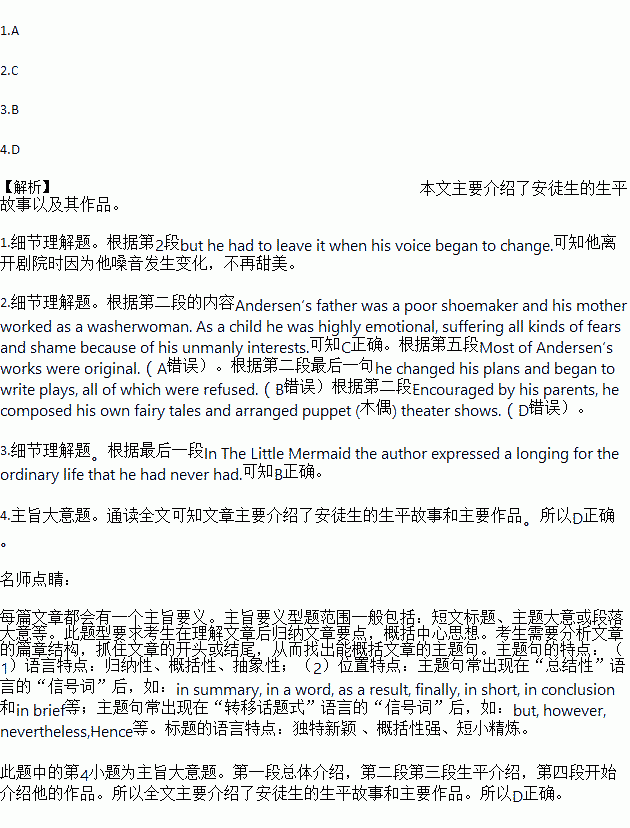题目内容
Hans Christian Andersen is a Danish writer famous for his fairy tales, many of which depict (描述) characters who gain happiness in life after suffering and conflict.
Andersen’s father was a poor shoemaker and his mother worked as a washerwoman. As a child he was highly emotional, suffering all kinds of fears and shame because of his unmanly interests. Encouraged by his parents, he composed his own fairy tales and arranged puppet (木偶) theater shows. At the age of 14, Andersen moved to Copenhagen to start a career as a singer—he had a beautiful voice. He succeeded in becoming associated with Royal Theater, but he had to leave it when his voice began to change. When casually referred to as a poet, he changed his plans and began to write plays, all of which were refused.
In 1822, Jonas Collin, the director of the Royal Theater, gave Andersen a grant to enter the grammar school at Slagelse. In 1827, Andersen gained admission to Copenhagen University, where he completed his education. In 1828 he wrote a shot story on travel, a fantastic tale in the style of the German Romantic writer, E. T. A. Hofmann. He traveled widely in Europe and remained a passionate traveler all his life.
As a novelist, Andersen made his breakthrough with The Improvisatore. The story described a poor boy’s integration (融合) into society, an Ugly Duckling theme of self-discovery. The book gained international success and remains the most widely read of all his works.
In his early collections, Andersen returned to the stories that he had heard as a child, but gradually he started to create his own tales. Most of Andersen’s works were original. Only 12 of his 156 known fairy stories drew on folktales.
The ugliness of the hero or heroine in his stories often conceals (隐藏) great beauty,which is revealed (揭示) after misfortune. Some of Andersen’s tales reveal a positive belief in the victory of the good, among them, The Snow Queen and The Ugly Duckling, and some end unhappily, like the Little Match Girl. In The Little Mermaid the author expressed a longing for the ordinary life that he had never had. Andersen never married, and he died in his home in Rolighed in 1875.
Snow Queen and The Ugly Duckling, and some end unhappily, like the Little Match Girl. In The Little Mermaid the author expressed a longing for the ordinary life that he had never had. Andersen never married, and he died in his home in Rolighed in 1875.
1.Why did Andersen leave the Royal Theater?
A. He no longer had a beautiful voice.
B. He would rather become a poet than a singer.
C. He wanted to travel abroad instead.
D. He had to go to school to study.
2.Which of the following statements is TRUE about Andersen?
A. Most of his works came from folktales he had heard.
B. The early plays he wrote achieved great success.
C. He had an unhappy life in childhood.
D. His parents were against his effort to compose fairy tales.
3.What did Andersen try to express in The Little Mermaid?
A. Happiness gained after suffering and conflict.
B. The desire for an ordinary life.
C. The failure to fit into society.
D. Great beauty concealed by ugliness.
4.What is the text mainly about?
A. How Andersen led his childhood.
B. How Andersen’s works finally became well-known.
C. The excellent works of Andersen.
D. An introduction to Andersen’s life and works.
 黄冈冠军课课练系列答案
黄冈冠军课课练系列答案Bobby Moresco grew up in New York's Hell's Kitchen,a tough working-class neighbourhood on Manhattan's West Side.By tradition he(41)B have been a construction worker or a policeman,just like his father and most of his childhood pals.(42)C,he wanted out.Attracted by the bright lights from the time Bobby was a teen,he tried to(43)D."I wasn't a(44)D actor,but I had a driving need to do something (45)A with my life,"he said.
He moved to Hollywood,promising to find his(46)C.But he didn't make it.For almost 10years,he drove a taxi and worked as a waiter,volunteering at an actors'workshop that he opened in Hollywood.But Moresco kept working at his(47)B career.
In 1983his younger brother was murdered in a mob-linked killing.Moresco was forced to give up working and moved back to his(48)C neighbourhood.In 1988he finally wrote a play that was(49)Dto his life.Called Half-Deserted Streets,it was based on his brother's(50)Cand staged at a small theater.A Hollywood producer(51)Bto see it and asked him to work on a screenplay.
His(52)Dgrew,and he got enough assignments to move back to Hollywood.However,it was never easy.By 2003,he was(53)Aout of work and out of cash(54)B he got a call from Paul Haggis,a director who had befriended him.The two worked on the script and tried some famous studios,but their request was(55)D.Moresco believed so(56)Ain the script that he borrowed money,and sold his house.At last the writers found an independent film producer who would take a chance.
The(57)B,Crash,slipped into the theatres in May 2005,and quietly became both a hit and an overnight success.It(58)Chim two Academy Awards-Best Film Editing and Best Writing.
At the age of 54,Bobby Moresco became an(59)C success."If you have something you want to do in life,don't think about the problems,"he says,"think about the(60)Ato get it done."
| 41.A.must | B.should | C.can | D.need |
| 42.A.Then | B.Therefore | C.However | D.Besides |
| 43.A.study | B.drive | C.teach | D.act |
| 44.A.simple | B.strict | C.firm | D.good |
| 45.A.different | B.impressive | C.effective | D.necessary |
| 46.A.occasion | B.treasure | C.fortune | D.possibility |
| 47.A.afforded | B.chosen | C.respected | D.offered |
| 48.A.early | B.worn | C.old | D.passed |
| 49.A.turned | B.pointed | C.belonged | D.related |
| 50.A.arresting | B.injuring | C.killing | D.shooting |
| 51.A.advised | B.happened | C.intended | D.planned |
| 52.A.influence | B.ambition | C.success | D.reputation |
| 53.A.again | B.even | C.finally | D.still |
| 54.A.before | B.when | C.since | D.while |
| 55.A.letout | B.looked down | C.taken off | D.turned down |
| 56.A.strongly | B.hardly | C.deeply | D.bravely |
| 57.A.actor | B.movie | C.studio | D.director |
| 58.A.gave | B.failed | C.won | D.allowed |
| 59.A.effortless | B.enjoyable | C.overnight | D.optimistic |
| 60.A.ways | B.lines | C.manners | D.actions |
| A. | makes up | B. | consists of | C. | is included | D. | is contained. |
| A. | was staying | B. | stayed | C. | would stay | D. | had stayed |


